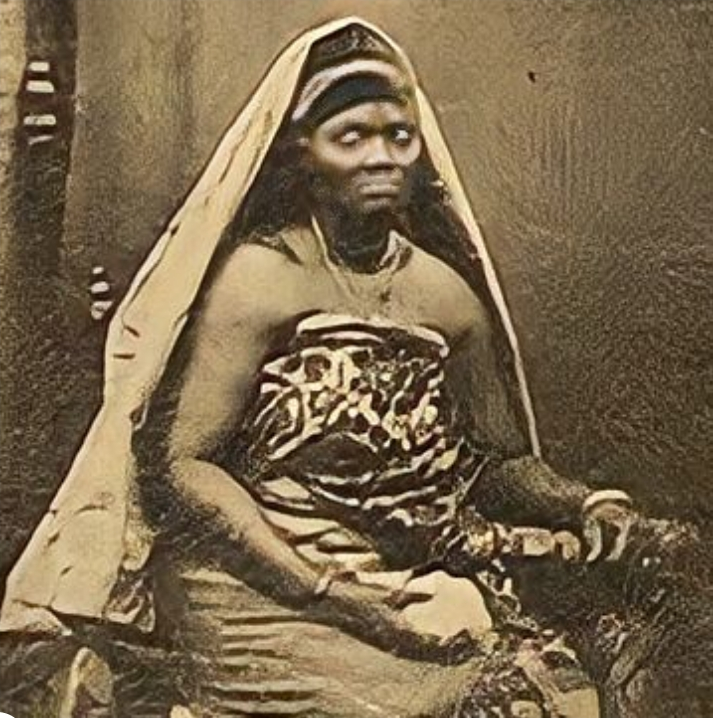In the vibrant, bustling city of Lagos during the 19th century, one woman rose above societal constraints to wield unparalleled influence over commerce, politics, and power. Madame Tinubu, a formidable businesswoman and political strategist, defied the male-dominated norms of her era, leaving an indelible mark on the history of pre-colonial and colonial Lagos. Her story is one of resilience, ambition, and cunning, as she navigated complex dynamics to become a celebrated yet controversial icon whose legacy endures.
Early Life and Humble Beginnings
Born around 1810 in the Egba Forest region, Tinubu grew up steeped in the trading traditions of her mother and grandmother, both successful merchants. Their expertise in commerce laid the foundation for her future. By her early twenties, she joined the migration of Egba people to Abeokuta in 1830, a move that would set the stage for her remarkable journey. Little is known of her early years, but her innate business acumen surfaced after tragedy struck. Widowed young and left to raise two sons alone, Tinubu turned to trading herbal tree bark, leaves, and roots-a skill inherited from her grandmother. Her sharp marketing instincts, honed by her mother’s food-selling ventures, propelled her success in Abeokuta’s competitive markets.
A Marriage That Changed History
Tinubu’s life took a pivotal turn in 1833 when she caught the eye of Adele, the exiled Oba of Lagos, during his visit to Abeokuta. Charmed by her charisma and intelligence, Adele married her and brought her to Badagry, his place of refuge. This union was more than a marriage; it was a gateway to power. Tinubu leveraged Adele’s political connections and status to build a sprawling trading empire, dealing in salt, cotton, tobacco, and palm oil with European merchants. As the transatlantic slave trade flourished, she entered this lucrative yet morally fraught enterprise, exchanging enslaved people from Abeokuta for European goods and ammunition. Within two years, her business acumen and strategic alliances transformed her into one of Abeokuta’s wealthiest and most influential figures.
Political Powerhouse in Colonial Lagos
When Adele reclaimed the Lagos throne in 1835, Tinubu’s influence soared. She plunged into the political fray, using her wealth, European ties, and local networks to shape the city’s power dynamics. Her pivotal moment came after Adele’s death in 1837, when rival factions vied for the throne. Tinubu backed Oluwole, Adele’s son, against Kosoko, a formidable contender. Despite being a relative newcomer to Lagos, her strategic maneuvering secured Oluwole’s ascension in 1837, cementing her as a political kingmaker. Her influence grew further through her marriage to Yesufu, a powerful war chief, whose military clout bolstered her expanding slave-trading empire.
Tinubu’s political savvy shone again in 1841 when she supported Akitoye, Adele’s brother, over Kosoko for the throne. Akitoye’s victory, fueled by her wealth and connections, granted her control over lucrative enterprises, including an expanded slave trade. However, Kosoko’s return in 1845 sparked a coup, forcing Akitoye and Tinubu into exile in Badagry. Undeterred, Tinubu continued trading, becoming the primary intermediary between European and local merchants. She amassed a private army, sustaining the slave trade and plotting Akitoye’s restoration.
Clash with the British and Exile
The 1850s brought seismic change as Britain intensified efforts to abolish the slave trade. Akitoye, seeking British support to reclaim the throne, signed a treaty in 1852 banning slavery in Lagos after British forces ousted Kosoko. Tinubu, however, resisted. Her covert slave-trading operations clashed with British interests, making her a target. Benjamin Campbell, the British Consul, publicly denounced her, sparking a fierce standoff. Tinubu challenged British authority, rallying local support, but her defiance led to her banishment to Abeokuta in 1852 under Akitoye’s reluctant orders after a failed plot against Campbell.
A New Chapter in Abeokuta
Exile did not diminish Tinubu’s ambition. In Abeokuta, she adapted to the shifting economic landscape, trading legally with European and local merchants. Her business ventures fueled Abeokuta’s growth, and her influence extended to regional conflicts. When the Kingdom of Dahomey threatened Abeokuta, Tinubu supplied warriors with arms, securing a decisive victory. In gratitude, she was named the Iyalode of Egbaland in 1879—the first woman to hold this prestigious title. She also shaped local politics, backing Prince Oyekan as the Alake of Egbaland.
A Complex Legacy
Madame Tinubu’s life was a tapestry of triumph and controversy. Her dominance in Lagos’s economic and political spheres showcased her as a trailblazer who shattered gender barriers. Yet her role in the slave trade remains a point of moral contention, reflecting the era’s complex social and economic realities. Her story, woven with ambition, resilience, and defiance, is commemorated in Lagos’s Tinubu Square and a statue in Abeokuta, symbols of her enduring impact.
Madame Tinubu was no ordinary woman. She was a force of nature, navigating the turbulent waters of 19th-century Lagos with unmatched skill. Her legacy, both celebrated and debated, reminds us of the power of determination in shaping history.



No comments yet
Be the first to share your thoughts!